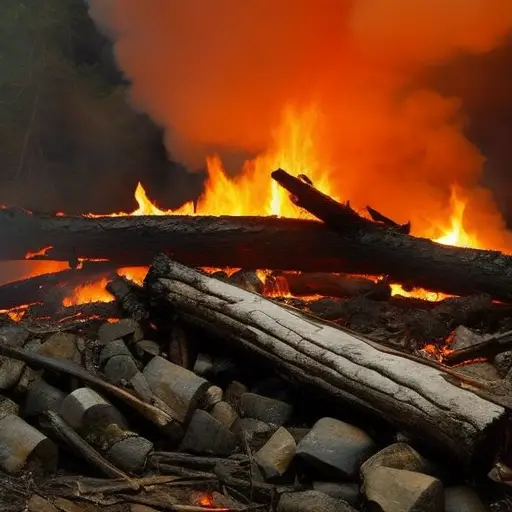The Importance of Mental Strength in Wilderness Survival

In the wild, survival is not solely dependent on physical prowess, but also on the strength of one’s mind. According to recent research, a staggering 90% of survival situations are attributed to mental preparedness and resilience. This statistic vividly highlights the critical role that mental strength plays in ensuring survival in the unforgiving wilderness.
In this article, we will explore the importance of developing and cultivating mental fortitude. We will also discuss practical strategies for maintaining focus, making rational decisions, and ultimately increasing your chances of survival in challenging environments.
The Power of a Strong Mind
One of the key elements for successfully navigating the challenges of wilderness survival is harnessing the power of a resilient mind. Mental toughness and inner strength are crucial in overcoming the physical and psychological obstacles that one may encounter in the wild.
In the face of adversity, mental toughness allows individuals to remain focused and composed, making rational decisions even in high-stress situations. It enables them to adapt to changing circumstances and find solutions to unexpected challenges. A strong mind is essential for enduring the physical hardships of the wilderness, such as extreme weather conditions, lack of food and water, and physical exhaustion.
Inner strength, on the other hand, provides individuals with the motivation and determination needed to persevere through difficult times. It allows them to tap into their inner resources and find the courage to keep going, even when faced with fear or uncertainty. Inner strength empowers individuals to push past their limits, embracing discomfort and embracing the unknown.
Developing mental toughness and inner strength requires practice, self-reflection, and a willingness to step out of one’s comfort zone. Techniques such as mindfulness meditation, visualization, and positive self-talk can help individuals cultivate a resilient mindset.
Overcoming Fear and Panic
The ability to conquer fear and panic is a critical aspect of developing mental strength in wilderness survival. In high-stress situations, it is natural for fear and panic to arise, but it is essential to control these emotions and stay calm.
Here are three strategies to overcome fear and panic in the wilderness:
-
Deep breathing: When confronted with fear or panic, take slow, deep breaths. This technique helps regulate your heart rate and oxygen flow, allowing you to regain control of your emotions and think more clearly.
-
Positive self-talk: Replace negative thoughts with positive affirmations. Remind yourself of your capabilities and past successes. By reinforcing a positive mindset, you can regain confidence and overcome fear.
-
Focus on the present: When fear and panic set in, concentrate on the present moment. Pay attention to your surroundings, evaluate your resources, and make rational decisions based on the information available. By focusing on the present, you can prevent your mind from spiraling into worst-case scenarios.
By mastering these techniques and staying calm in the face of fear and panic, you can develop the mental resilience necessary for survival in the wilderness.
In the next section, we will explore strategies for developing resilience in survival situations.
Developing Resilience in Survival Situations
To further fortify one’s mental strength in wilderness survival, it is crucial to cultivate resilience in navigating challenging survival situations. Building mental toughness and developing emotional resilience are key aspects of developing this resilience.
Building mental toughness involves training the mind to remain focused, positive, and resilient in the face of adversity. It requires developing a strong mindset that can withstand stress, uncertainty, and discomfort. This can be achieved through various techniques such as visualization exercises, positive self-talk, and controlled breathing.
Developing emotional resilience is equally important in survival situations. It involves the ability to manage and regulate emotions effectively, ensuring that they do not impede decision-making and problem-solving. This can be achieved through mindfulness practices, emotional awareness, and learning to adapt to changing circumstances without becoming overwhelmed.
In order to provide a clearer understanding, let’s take a look at the following table:
| Building Mental Toughness | Developing Emotional Resilience |
|---|---|
| Visualization exercises | Mindfulness practices |
| Positive self-talk | Emotional awareness |
| Controlled breathing | Adaptability |
Maintaining Focus and Mental Clarity
Maintaining focus and mental clarity is crucial in wilderness survival situations. Mind over matter becomes a key principle, as the ability to stay mentally strong can help overcome physical challenges and obstacles.
Developing mental resilience techniques and practicing remaining calm under pressure are essential skills for staying focused and making clear decisions in the face of adversity.
Mind Over Matter
With a focus on maintaining mental clarity, wilderness survival relies heavily on the ability to stay focused and make sound decisions. In the face of extreme physical and emotional challenges, mental toughness and psychological endurance become paramount.
Here are three key strategies to help maintain focus and mental clarity in a wilderness survival situation:
-
Visualization: Visualize successful outcomes and positive scenarios. This not only helps to boost morale but also keeps the mind focused on the task at hand.
-
Mindfulness: Practice being fully present in the moment. Pay attention to your surroundings, your thoughts, and your emotions. This helps to prevent distractions and enhances decision-making abilities.
-
Self-talk: Use positive and empowering self-talk to maintain mental resilience. Remind yourself of your strengths, previous successes, and the reasons why you must persevere.
Mental Resilience Techniques
One key aspect of wilderness survival is the development and application of mental resilience techniques, which are crucial for maintaining focus and mental clarity in challenging situations. Mindfulness exercises and emotional regulation techniques are two effective ways to enhance mental resilience in the wilderness.
Mindfulness exercises involve being fully present in the moment, paying attention to thoughts, feelings, and sensations without judgment. This practice can help individuals stay focused on their immediate surroundings and make clear-headed decisions, even in stressful situations. Taking a few moments each day to practice mindfulness can strengthen mental resilience and improve overall well-being.
Emotional regulation techniques, on the other hand, involve managing and controlling emotions in a healthy and productive manner. This can be achieved through deep breathing exercises, visualizations, or positive self-talk. By regulating emotions, individuals can maintain mental clarity and make rational decisions, even when faced with fear or panic.
Table: Mental Resilience Techniques
| Technique | Description |
|---|---|
| Mindfulness exercises | Being fully present in the moment, paying attention to thoughts, feelings, and sensations |
| Emotional regulation | Managing and controlling emotions in a healthy and productive manner through various techniques |
Calm Under Pressure
To remain composed and think clearly in high-stress situations, individuals must cultivate a sense of calm and mental clarity. When faced with wilderness survival scenarios, maintaining emotional control and staying composed can mean the difference between life and death. Here are three practical strategies to help you stay calm under pressure:
-
Breathing Techniques: Deep, slow breaths can help regulate your heart rate and calm your mind. Practice diaphragmatic breathing by inhaling deeply through your nose, holding for a few seconds, and exhaling slowly through your mouth.
-
Visualization: Imagine yourself in a peaceful and safe environment. Visualize the steps you need to take to overcome the current challenge. This technique can help reduce anxiety and improve focus.
-
Positive Self-Talk: Use positive affirmations to boost your confidence and maintain mental clarity. Remind yourself that you have the skills and knowledge to handle the situation. Repeat empowering phrases such as ‘I am calm and capable’ or ‘I can overcome any obstacle.’
Making Rational Decisions Under Pressure
Maintaining a clear and focused mindset is crucial for making rational decisions under pressure in wilderness survival situations. When faced with life-or-death situations, critical thinking and problem-solving skills become paramount. Being able to analyze the situation, identify potential risks, and devise effective solutions is essential for survival.
To illustrate the importance of making rational decisions under pressure, let’s consider a scenario where a hiker is lost in the wilderness. The table below highlights the contrasting outcomes that can result from both rational and irrational decision-making:
| Rational Decision | Irrational Decision |
|---|---|
| Staying put and conserving energy | Panic and aimlessly wandering |
| Building a shelter and finding a water source | Ignoring immediate needs |
| Using available resources for signaling for help | Giving up and despairing |
| Prioritizing safety and assessing risks | Taking unnecessary risks |
| Calmly evaluating options and making a plan | Making impulsive and reckless choices |
As demonstrated in the table, making rational decisions under pressure can significantly increase the chances of survival. By maintaining a clear and focused mindset, individuals can approach problems systematically, weighing the risks and benefits before taking action. This level-headedness allows for more effective problem-solving and increases the likelihood of a successful outcome in wilderness survival situations.
Cultivating a Positive Mindset for Survival Success
In cultivating a positive mindset for survival success, it is essential to foster a resilient and optimistic attitude. Building mental fortitude is crucial in overcoming the challenges that wilderness survival presents. Here are three practical ways to cultivate a positive mindset:
-
Develop a growth mindset: Embrace the belief that your abilities and intelligence can be developed through dedication and hard work. This mindset allows you to see challenges as opportunities for growth and learning, rather than insurmountable obstacles.
-
Practice mindfulness: Harness the mind’s potential by staying present and focused on the task at hand. Mindfulness helps to reduce stress, increase self-awareness, and enhance decision-making abilities. By training your mind to be fully engaged in the present moment, you can effectively respond to the demands of survival situations.
-
Foster gratitude: Cultivate an attitude of gratitude by acknowledging and appreciating the resources and support available to you. Expressing gratitude not only boosts your mood but also helps you stay motivated and hopeful during challenging times.
Frequently Asked Questions
How Many Days Can a Person Survive Without Food in a Wilderness Survival Situation?
In a wilderness survival situation, the number of days a person can survive without food depends on various factors such as individual health, exertion level, and environmental conditions. However, survival strategies and emergency rations can greatly extend a person’s ability to endure without food.
What Are Some Common Physical Injuries Encountered in Wilderness Survival Situations?
In wilderness survival situations, common physical injuries include cuts, bruises, sprains, fractures, and animal bites. Proper wilderness first aid training is crucial to treat these injuries and mitigate further harm.
Are There Any Specific Mental Exercises or Techniques That Can Help Build Mental Strength?
Mental resilience techniques, such as mindfulness practices, can help build mental strength. These exercises focus on developing self-awareness, emotional regulation, and the ability to stay calm and focused in challenging situations, which are crucial in wilderness survival.
How Can One Prepare Mentally for the Challenges of a Wilderness Survival Situation?
Mental preparation is crucial in facing the challenges of a wilderness survival situation. By developing coping strategies, individuals can effectively manage stress, fear, and uncertainty, enabling them to make rational decisions and increase their chances of survival.
What Are Some Common Psychological Effects Experienced During and After a Wilderness Survival Experience?
During and after a wilderness survival experience, individuals may experience a range of psychological effects. These effects can vary widely, but common experiences include heightened anxiety, difficulty sleeping, flashbacks, and a sense of isolation. Coping mechanisms and support systems are crucial for managing these effects in the long term.
Conclusion
In conclusion, mental strength is a crucial aspect of wilderness survival. It enables individuals to overcome fear and panic, develop resilience, maintain focus and clarity, and make rational decisions under pressure.
Cultivating a positive mindset is essential for success in survival situations. Like a sturdy oak tree standing strong amidst a storm, mental strength serves as a foundation for survival, providing the necessary tools to navigate through challenging circumstances.





